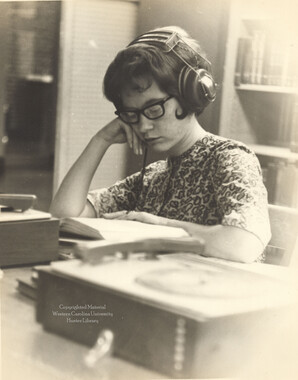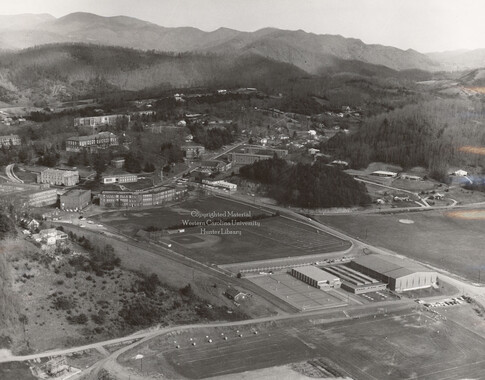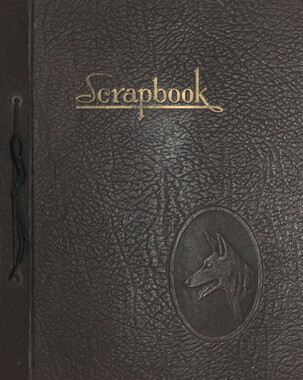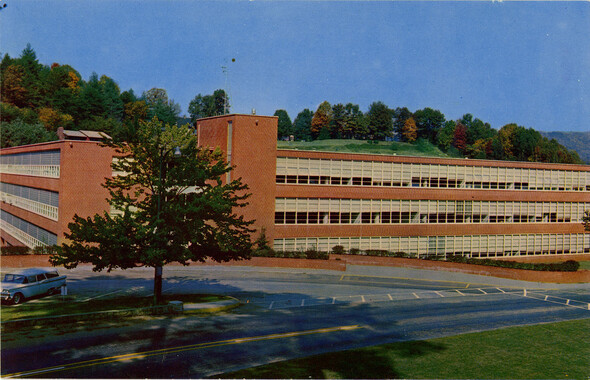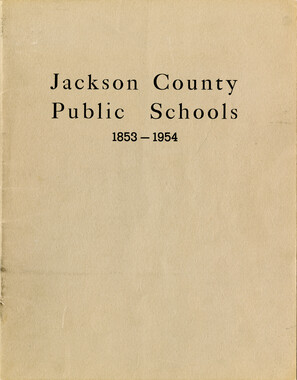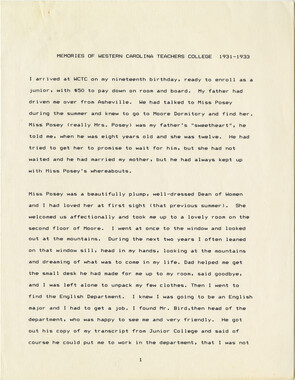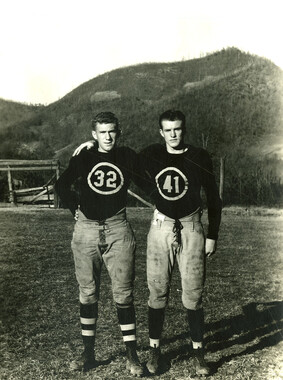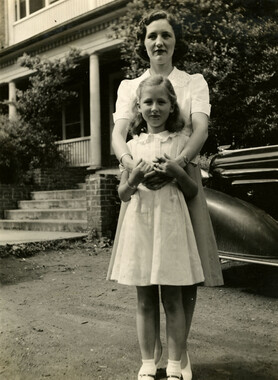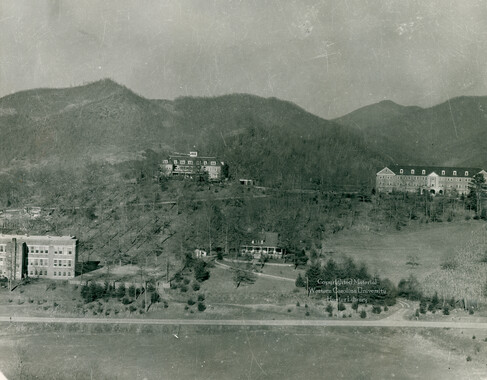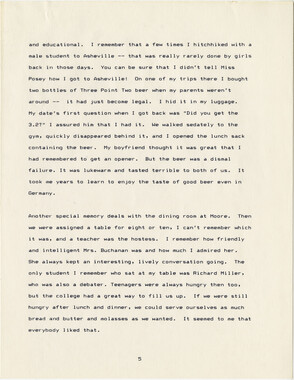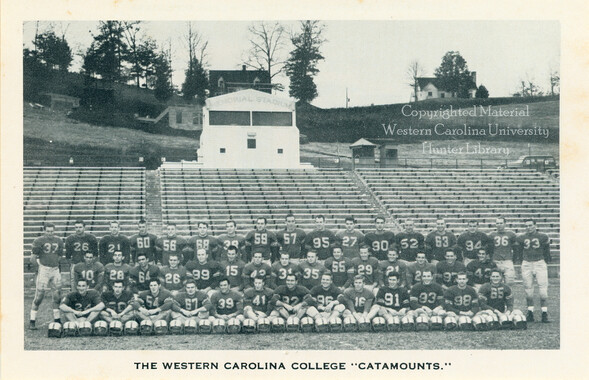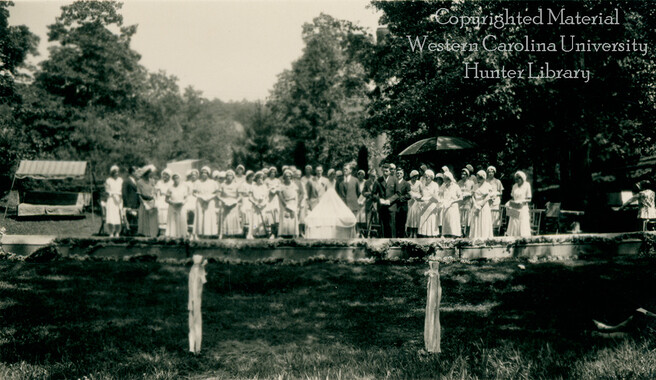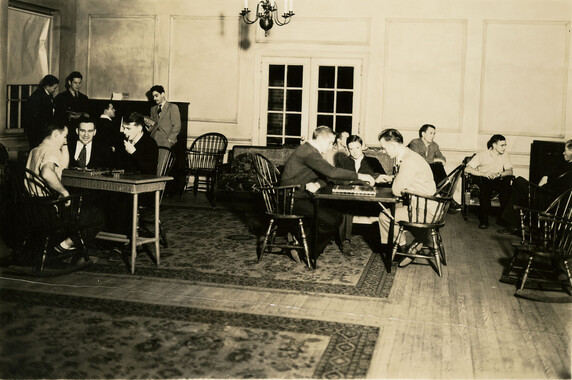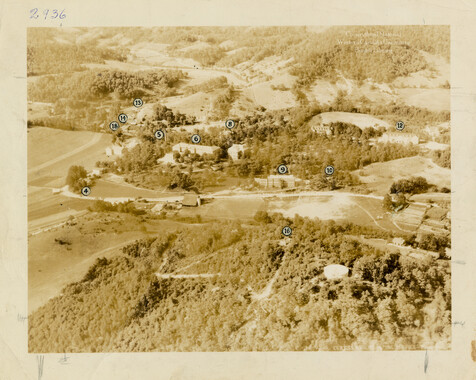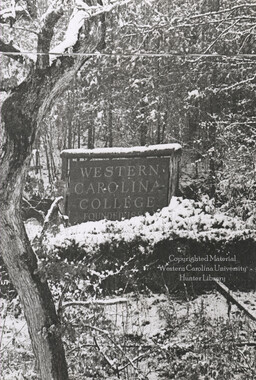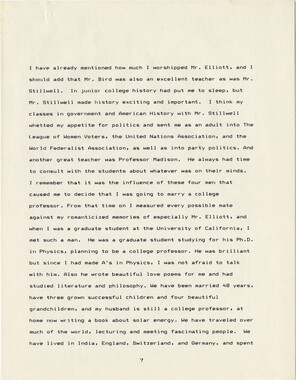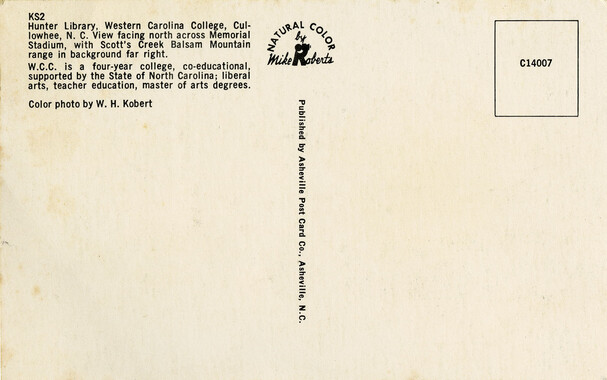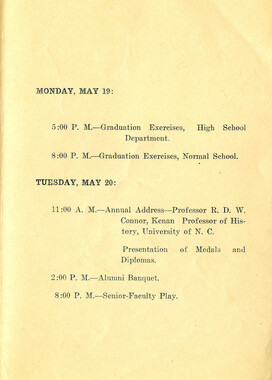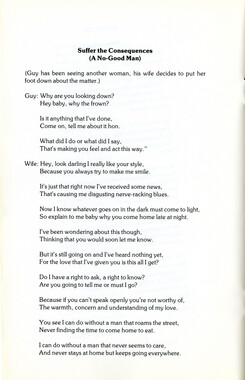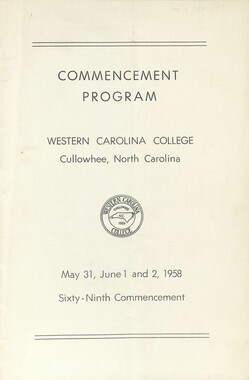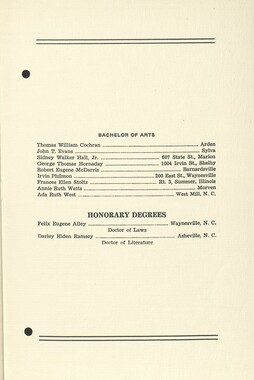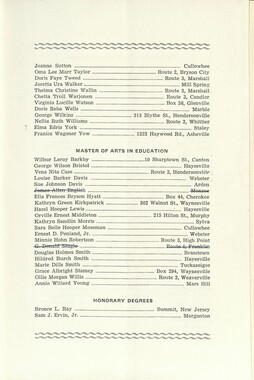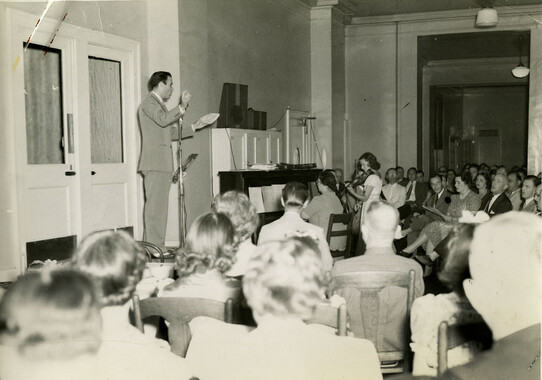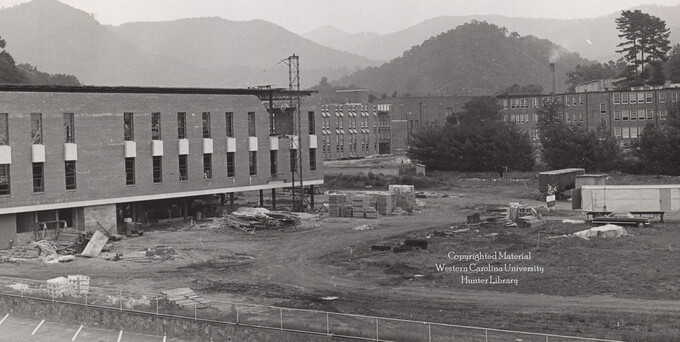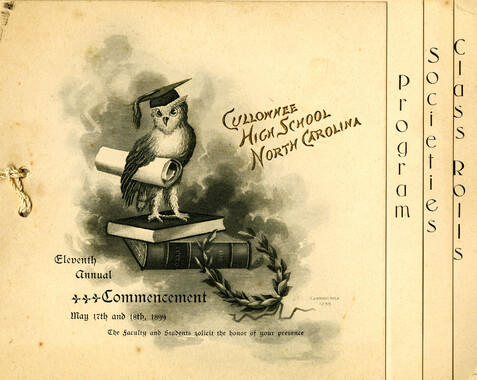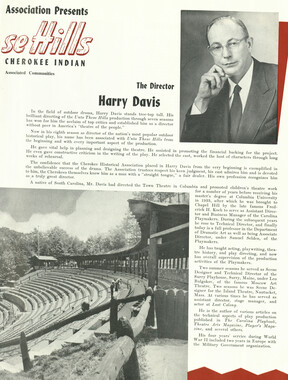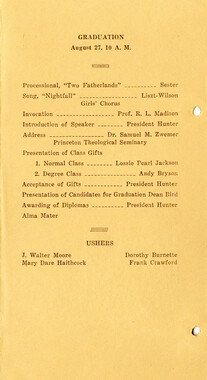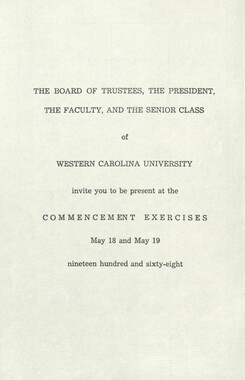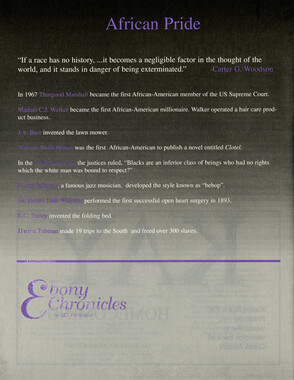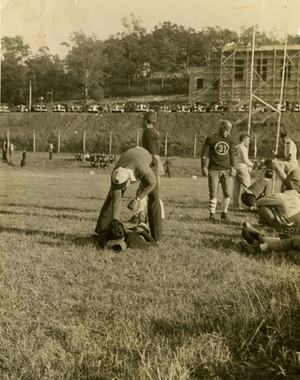Western Carolina University (20)
View all
- Canton Champion Fibre Company (2308)
- Cherokee Traditions (293)
- Civil War in Southern Appalachia (165)
- Craft Revival (1942)
- Great Smoky Mountains - A Park for America (2767)
- Highlights from Western Carolina University (430)
- Horace Kephart (941)
- Journeys Through Jackson (154)
- LGBTQIA+ Archive of Jackson County (19)
- Oral Histories of Western North Carolina (314)
- Picturing Appalachia (6679)
- Stories of Mountain Folk (413)
- Travel Western North Carolina (160)
- Western Carolina University Fine Art Museum Vitreograph Collection (129)
- Western Carolina University Herbarium (92)
- Western Carolina University: Making Memories (708)
- Western Carolina University Publications (2283)
- Western Carolina University Restricted Electronic Theses and Dissertations (146)
- Western North Carolina Regional Maps (71)
- World War II in Southern Appalachia (131)
University of North Carolina Asheville (6)
View all
- Ensley, A. L. (Abraham Lincoln), 1865-1948 (1)
- Western Carolina College (31)
- Western Carolina Teachers College (43)
- Allanstand Cottage Industries (0)
- Appalachian National Park Association (0)
- Bennett, Kelly, 1890-1974 (0)
- Berry, Walter (0)
- Brasstown Carvers (0)
- Cain, Doreyl Ammons (0)
- Carver, George Washington, 1864?-1943 (0)
- Cathey, Joseph, 1803-1874 (0)
- Champion Fibre Company (0)
- Champion Paper and Fibre Company (0)
- Cherokee Indian Fair Association (0)
- Cherokee Language Program (0)
- Crittenden, Lorraine (0)
- Crowe, Amanda (0)
- Edmonston, Thomas Benton, 1842-1907 (0)
- Fromer, Irving Rhodes, 1913-1994 (0)
- George Butz (BFS 1907) (0)
- Goodrich, Frances Louisa (0)
- Grant, George Alexander, 1891-1964 (0)
- Heard, Marian Gladys (0)
- Kephart, Calvin, 1883-1969 (0)
- Kephart, Horace, 1862-1931 (0)
- Kephart, Laura, 1862-1954 (0)
- Laney, Gideon Thomas, 1889-1976 (0)
- Masa, George, 1881-1933 (0)
- McElhinney, William Julian, 1896-1953 (0)
- Niggli, Josephina, 1910-1983 (0)
- North Carolina Park Commission (0)
- Osborne, Kezia Stradley (0)
- Owens, Samuel Robert, 1918-1995 (0)
- Penland Weavers and Potters (0)
- Rhodes, Judy (0)
- Roberts, Vivienne (0)
- Roth, Albert, 1890-1974 (0)
- Schenck, Carl Alwin, 1868-1955 (0)
- Sherrill's Photography Studio (0)
- Smith, Edward Clark (0)
- Southern Highland Handicraft Guild (0)
- Southern Highlanders, Inc. (0)
- Stalcup, Jesse Bryson (0)
- Stearns, I. K. (0)
- Thompson, James Edward, 1880-1976 (0)
- United States. Indian Arts and Crafts Board (0)
- USFS (0)
- Vance, Zebulon Baird, 1830-1894 (0)
- Weaver, Zebulon, 1872-1948 (0)
- Western Carolina University (0)
- Western Carolina University. Mountain Heritage Center (0)
- Whitman, Walt, 1819-1892 (0)
- Wilburn, Hiram Coleman, 1880-1967 (0)
- Williams, Isadora (0)
- 1880s (4)
- 1890s (34)
- 1900s (103)
- 1910s (29)
- 1920s (63)
- 1930s (132)
- 1940s (90)
- 1950s (63)
- 1960s (68)
- 1970s (40)
- 1980s (54)
- 1990s (18)
- 2000s (10)
- 2010s (3)
- 1600s (0)
- 1700s (0)
- 1800s (0)
- 1810s (0)
- 1820s (0)
- 1830s (0)
- 1840s (0)
- 1850s (0)
- 1860s (0)
- 1870s (0)
- 2020s (0)
- Appalachian Region, Southern (1)
- Jackson County (N.C.) (683)
- Macon County (N.C.) (3)
- Qualla Boundary (2)
- Asheville (N.C.) (0)
- Avery County (N.C.) (0)
- Blount County (Tenn.) (0)
- Buncombe County (N.C.) (0)
- Cherokee County (N.C.) (0)
- Clay County (N.C.) (0)
- Graham County (N.C.) (0)
- Great Smoky Mountains National Park (N.C. and Tenn.) (0)
- Haywood County (N.C.) (0)
- Henderson County (N.C.) (0)
- Knox County (Tenn.) (0)
- Knoxville (Tenn.) (0)
- Lake Santeetlah (N.C.) (0)
- Madison County (N.C.) (0)
- McDowell County (N.C.) (0)
- Mitchell County (N.C.) (0)
- Polk County (N.C.) (0)
- Rutherford County (N.C.) (0)
- Swain County (N.C.) (0)
- Transylvania County (N.C.) (0)
- Watauga County (N.C.) (0)
- Waynesville (N.C.) (0)
- Yancey County (N.C.) (0)
- Aerial Views (44)
- Artifacts (object Genre) (2)
- Biography (general Genre) (1)
- Clippings (information Artifacts) (4)
- Drawings (visual Works) (1)
- Fliers (printed Matter) (1)
- Glass Plate Negatives (1)
- Interviews (5)
- Letters (correspondence) (7)
- Manuscripts (documents) (4)
- Photographs (516)
- Plans (maps) (1)
- Poetry (3)
- Postcards (6)
- Programs (documents) (121)
- Publications (documents) (12)
- Scrapbooks (5)
- Slides (photographs) (22)
- Sound Recordings (4)
- Speeches (documents) (1)
- Transcripts (3)
- Aerial Photographs (0)
- Albums (books) (0)
- Articles (0)
- Cards (information Artifacts) (0)
- Crafts (art Genres) (0)
- Depictions (visual Works) (0)
- Design Drawings (0)
- Envelopes (0)
- Facsimiles (reproductions) (0)
- Fiction (general Genre) (0)
- Financial Records (0)
- Guidebooks (0)
- Internegatives (0)
- Land Surveys (0)
- Maps (documents) (0)
- Memorandums (0)
- Minutes (administrative Records) (0)
- Negatives (photographs) (0)
- Newsletters (0)
- Newspapers (0)
- Occupation Currency (0)
- Paintings (visual Works) (0)
- Pen And Ink Drawings (0)
- Periodicals (0)
- Personal Narratives (0)
- Portraits (0)
- Questionnaires (0)
- Sheet Music (0)
- Specimens (0)
- Text Messages (0)
- Tintypes (photographs) (0)
- Video Recordings (physical Artifacts) (0)
- Vitreographs (0)
- A.L. Ensley Collection (1)
- Appalachian Industrial School Records (0)
- Appalachian National Park Association Records (0)
- Axley-Meroney Collection (0)
- Bayard Wootten Photograph Collection (0)
- Bethel Rural Community Organization Collection (0)
- Blumer Collection (0)
- C.W. Slagle Collection (0)
- Canton Area Historical Museum (0)
- Carlos C. Campbell Collection (0)
- Cataloochee History Project (0)
- Cherokee Studies Collection (0)
- Daisy Dame Photograph Album (0)
- Daniel Boone VI Collection (0)
- Doris Ulmann Photograph Collection (0)
- Elizabeth H. Lasley Collection (0)
- Elizabeth Woolworth Szold Fleharty Collection (0)
- Frank Fry Collection (0)
- George Masa Collection (0)
- Gideon Laney Collection (0)
- Hazel Scarborough Collection (0)
- Hiram C. Wilburn Papers (0)
- Historic Photographs Collection (0)
- Horace Kephart Collection (0)
- Humbard Collection (0)
- Hunter and Weaver Families Collection (0)
- I. D. Blumenthal Collection (0)
- Isadora Williams Collection (0)
- Jesse Bryson Stalcup Collection (0)
- Jim Thompson Collection (0)
- John B. Battle Collection (0)
- John C. Campbell Folk School Records (0)
- John Parris Collection (0)
- Judaculla Rock project (0)
- Kelly Bennett Collection (0)
- Love Family Papers (0)
- Major Wiley Parris Civil War Letters (0)
- Map Collection (0)
- McFee-Misemer Civil War Letters (0)
- Mountain Heritage Center Collection (0)
- Norburn - Robertson - Thomson Families Collection (0)
- Pauline Hood Collection (0)
- Pre-Guild Collection (0)
- Qualla Arts and Crafts Mutual Collection (0)
- R.A. Romanes Collection (0)
- Rosser H. Taylor Collection (0)
- Samuel Robert Owens Collection (0)
- Sara Madison Collection (0)
- Sherrill Studio Photo Collection (0)
- Smoky Mountains Hiking Club Collection (0)
- Stories of Mountain Folk - Radio Programs (0)
- The Reporter, Western Carolina University (0)
- Venoy and Elizabeth Reed Collection (0)
- WCU Gender and Sexuality Oral History Project (0)
- WCU Mountain Heritage Center Oral Histories (0)
- WCU Oral History Collection - Mountain People, Mountain Lives (0)
- WCU Students Newspapers Collection (0)
- Western North Carolina Tomorrow Black Oral History Project (0)
- William Williams Stringfield Collection (0)
- Zebulon Weaver Collection (0)
- African Americans (3)
- Church buildings (10)
- College student newspapers and periodicals (8)
- Floods (1)
- Great Smoky Mountains National Park (N.C. and Tenn.) (1)
- Appalachian Trail (0)
- Artisans (0)
- Cherokee art (0)
- Cherokee artists -- North Carolina (0)
- Cherokee language (0)
- Cherokee pottery (0)
- Cherokee women (0)
- Civilian Conservation Corps (U.S.) (0)
- Dams (0)
- Dance (0)
- Education (0)
- Folk music (0)
- Forced removal, 1813-1903 (0)
- Forest conservation (0)
- Forests and forestry (0)
- Gender nonconformity (0)
- Hunting (0)
- Landscape photography (0)
- Logging (0)
- Maps (0)
- Mines and mineral resources (0)
- North Carolina -- Maps (0)
- Paper industry (0)
- Postcards (0)
- Pottery (0)
- Railroad trains (0)
- Rural electrification -- North Carolina, Western (0)
- School integration -- Southern States (0)
- Segregation -- North Carolina, Western (0)
- Slavery (0)
- Sports (0)
- Storytelling (0)
- Waterfalls -- Great Smoky Mountains (N.C. and Tenn.) (0)
- Weaving -- Appalachian Region, Southern (0)
- Wood-carving -- Appalachian Region, Southern (0)
- World War, 1939-1945 (0)
- Sound (4)
- StillImage (553)
- Text (153)
- MovingImage (0)
Interview with Sara Madison
-
This 14-page transcript of a 2007 interview Tim Osment conducted with Sara Madison, born in 1931. Madison shares her memories of growing up on campus, living in Davies Hall until third grade, and then moving to Buzzards Roost just above campus.
-
-
. ,. Sarah Madison 48:26 TO: OK. My name is Tim Osment, and today is Thursday, November 15,2007, and I am here in the home of Sarah Madison. I am going to let her explain more about her family context here in just a moment. We are doing some updated histories and recollections and reflections of Western Carolina University and the institutions that preceded it in name anyway. Sarah, thank you so much for inviting me today and letting me come up. The main thing we want to talk about is your memories ofWestern Carolina University, and I do want to say quickly, and you'll elaborate that, they go from the earliest years of your life to the latter years. And that spans a whole lot of different dynamics, and we'll talk about that in detail. (.56) But, before we talk about Western Carolina University, just give me a little brief history, biographically about yourself and your family and put it sort of in context. SM: I was actually born in Six Mile, South Carolina, but the reason for that was that I have an uncle that was a doctor down there and he would doctor the whole family. Everybody went down there for tonsils and whatever it happened to be. And so my father took my mother down there and left her and came back of course to his job in with the Jackson County Bank. He had gone to the Cherokee Indian Fair when the call came from South Carolina that I had been born so he immediately got (inaudible) and went to South Carolina, so that is the reason I could be called a Sand-Lapper and not a Tar Heel, because I was born in South Carolina. Actually, that place in South Carolina is filled with memories too, because my brother and I often went down there and stayed at the hospital. My aunt was in charge of the nurses and we ate out meals in the hostel so there are a thousand storied about things that happened down there. But, I was fortunate enough to born into two families that families were important, connections to friends were important, all children were expected to do well, and not to do anything to put a mark on the families' name. And so I think that we grew up with that all the time. I think my brother and I, or I felt always that. .. I guess there was just a little bit of pressure, because I always felt like ... JM: I'm sure you had more than I did. (2:53) SM: ... they held the hoop up and I jumped though it and they just held it higher the next time, you know, to jump through that. But, anyway, after my mother and father were married, we, my dad was working for the Jackson County Bank, and we moved to Sylva, or we moved into a little house that was called "The Little Yellow House" But it was right across the street from Emma Allison's house, and it was where Walter Jones lived, right behind the library. And it was called the Keener House; I think that is Keener Street. And I am sure it was just rent (?) when we were there ... and I can remember, my first memories was in that house. And also on the main street of Sylva. But then it wasn't long until Dad was asked, they came to him and asked if he would come to Western to be the business manager. And he accepted that position. (3 :48) We moved into a house in Dick's Gap that we called the Little Red Brick House. (laugher) and lived 1 ., there the first, a year anyway in that house. And then, since it was during the Depression years, Davies Hall, which was one of the early buildings on the campus. It was this wonderful old building on the campus, had been a girl's dormitory. And at that time, they probably didn't have enough students to urn, and they decided they needed a place for faculty members to live, so there were quite a number of faculty members who moved into Davies Hall. We moved into Davies Hall about six months before my brother was born in March of '35. TO: So you moved there at the very end of 34, into Davies Hall. SM: Right. And I just cannot, the most vivid memories I have are of growing up there on campus. TO: How long did you live there and at what age did you arrive there ... SM: Well, I was about three when we moved into Davies Hall and I was in the third grade when we moved up onto Buzzards Roost. So that was a nice long period in there in which we lived in Davies Hall. Of course, Mr. Hunter was the president and Dean Bird was dean of the college. And Dad was the business manager and Eddie Bean in admissions and Ruth Oliver Hines was the bursar. And ... TO: Do you remember Hunter and Bird? SM: Oh, just many many things, about both of them. Now, I have a group of these silly silly letters that Dean Bird and my father wrote to each other. They both loved the English language and they both could really foul it up. They could write backwards and pun and do all that sort of thing. (5:58) And I think sometime I need to copy all those people because a lot of people thought that Dean Bird was very proper and very prim but he was wonderful in these letters that he wrote back and forth to my father. And my mother had grown up with the Hunter, with Martha Lou Hunter, the oldest, and had been a really good friend of Martha Lou Hunter, and had spent nights in her home and so forth. And, probably a time that I remember very vividly, was when Mr. Hunter committed suicide (6:37). They called my daddy and John Worth McDevitt (McDivitt)(?) to come from Western to help look for him because he had gone up on the parkway over near Weaverville. And they went, to help out, to look for Mr. Hunter. Of course, there have always been questions about that and what really happened. But, he had had a stroke and I can remember seeing him come across the campus, you know his arm and one leg were partially paralyzed. I know that he was a very proud man and that was very hard to live with. TO: So, how old were you? Do you remember that? SM: When he committed suicide, we were still living in Davies Hall. I am almost positive that we were still living in Davies Hall. Mrs. Hunter was the jolliest, wonderful person. She was another one of those persons who had something to say about everything. (7:41) She was very liberal for her day and time. She was really like the 2 matron of Cullowhee. Not just the college, but everybody out in the community loved Mrs. Hunter. TO: What was the effect when the Professor Hunter, the president, did pass, on his family and on the Cullowhee community? SM: Oh, it was a sad, sad time. Western had some really hard times. I guess it was not until the building program, and I am not sure about my dates, here, when they built Breese and Hoey and McKee, and oh well, the first class that I went to in McKee was in the 3rd grade. TO: Did you attend through out your graded school years? SM: I did. And it was everybody from off every branch in high school. You know, they had their own little private schools until we got to high school and we were all together in high school. I was asking my husband about a community and the town/gown sort of thing. Well, there were some feelings; you know it is only natural that there were some feelings. I guess that we were considered privileged. (9:14) I hate to think what my dad's salary was, it was just pathetic, just really pathetic, but it was probably better than . .. but nine years of going to school with kids that came off of Speedwell, Worryhut and from Caney Fork and came down from Little Canada, I wouldn't take anything for those years. But I think that if you would ask the Dotson children and the Sutton children about going to school there ... I know that my brother and I spent our whole life trying to be part of their community. I mean, we always felt that little bit of. .. and today the people who are still living from those communities, I just love. Which Jessie Flake is one of them. (1 0:05) And they are just really part of my growing up there. TO: So there was a little bit of disconnect of what you could call "campus children and ones that came in from the community. What a wonderful opportunity. What do you remember about McKee? Were you there when Cordelia Camp was active and such as .. . SM: Well, see I actually started in old building that was down where Dodson Cafeteria is now. That was a class room building, it was a college building, but it was also where the student teachers did their teaching there. And I started in the first grade, which was just off the mountain, off the hill from Davies Hall. There for the first grade. And we had this wonderful teacher, Miss Raby, who had a master's degree from maybe Peabody or somewhere, but anyway she had all these new ideas. I remember one time she asked us to draw a picture of where we lived. And I drew this elaborate picture of Davies Hall with all of these windows and porches. And she came to me after class and she said 'Are you sure you live in this house?' (laughter) I mean it was just too fantastic, you know ,for her to think that I lived there but I did. TO: But you went to school at Western and received your Bachelors and Masters there. Was it just a transition, was it just ... (inaudible, talking over) SM: Oh, well, I was never going to Western ... 3 TO: Tell me about that. .. SM: Well, see, I had grown up with all these professors. I called them by their first names or even ... Miss Buchanan was Candy to us always. (11 :51) I was only sixteen when I went to Duke. I had a scholarship to Duke so I went there and I was never going to teach. See I had all these aunts who taught school and I remember them during the Depression, and that was something I was never ever going to do. So when I finished at Duke with a degree in English, I ended up going into merchandising (inaudible "at Macy's"?) (12:20) merchandising course. I did that for a year and I think that my father helped me out quite a bit for a year. And I decided it might be a good idea if I came back to Western and get. I had to get a BS in Education. It took a whole year. And then ... TO: How was it when you came back, after your year at Duke. You had left a little while and come back ... was there are-connections kind ofperiod? SM: Well, there was, but I still had some of my group of people who lived around, Dorothy Dodson still was there and I don't know, I just went back home to live. (13 :08) And sort of fit back in, you know, with the group I had been with before. TO: What kind of changes did you see on campus from when you moved there in the late 40's to maybe by 1960 when ... obviously fiscally it had changed ... SM: Oh, yeah, it had changed a great deal, and during the War, so many of the professors went off to serve. Almost all of them were officers, but then when they came back, they had the GI Bill, so they went on to ... I know Dr. Turner went on to Chapel Hill and got his Ph.D. and so did Keith Hines and ... so ... they were still there. But I have told somebody before that I am probably the only person who knew every single one of those presidents in those pictures that are in the library. Now, some of them, not very well, because there were years that I was gone. TO: Now, beginning with Robert Madison .. . SM: Right. Now I didn't know Mr. Reynolds, who was the next one, but then Mr. Hunter, and Reid and, you know, all the; ones down through those years ... so, if people don't get my story, then they ... I am the only person still living in Cullowhee who was there. (14:43) but the Cullowhee. Who was there. I remember [(inaudible) was Stiblin Mitchell?] but he came later (inaudible) and took over the cafeteria. TO: You were there during the 50's which was arguably the, you know the 60s were looked at as the tumultuously decade ... but the 50's began the Civil Rights Movement. SM: There was absolutely .... TO: What do you remember about gender and race and awareness ... (15:09) 4 SM: Not anything. Nothing at all. I think it was a little bit different the way we grew up. Of course, we had segregated schools, but my family had always been in some way connected with a black family in Cullowhee. The black families in Cullowhee. And Ada Streeter, who came to our house for about thirty years I guess, was just a member of the family. And I went to her house and ate and went to church with her, things like that. And I guess race was just, you know, it wasn't even ... I don't remember even thinking about it. TO: Well I was wondering, since you were in education, and that was when they had started integrating schools nationally, did they address that in your education things . .. this is something that is going to be different in your life? SM: (Sarah apparently nods affirmative) and I guess the gender thing, you know, "the man's in charge" and that's it. Although there were many people on the campus at Western who were very outspoken women. TO: Sounds like you were surrounded by some powerful women on campus. SM: I was! (laughter) TO: Who were some of these women? SM: Miss. Albright and Miss. Buchanan, certainly. (16:33) And she had a great influence on my life because she lived next door to us in Davies Hall. When I was just a little girl growing up, I was always fascinated with her, cause of the way she dressed. She always went to Columbia every summer, in New York. And she had connections in New York. In her apartment, there was a great big bookcase, rather wide, in her apartment, and she had pictures of all these people in New York and they had autographs at the bottom of them and she was a good friend ofThomas Wolfe's sister, Mable (17:16) in Asheville. But she brought, they were called Lyceum programs, and she brought music. And she played opera at the highest decibel day and night, next door. So, I had heard all the operas by the time I was, you know, in high school. But we didn't seem to mind, because she was such a good neighbor. She was always wonderful help when somebody was sick. She could make the best vegetable soup, it had cabbage in it. She was always; she was always a good friend. And then, of course, Miss. Albright and Miss. Camp, were (laughter) Miss Camp was always frightened me. And I guess Miss Albright too. I think they always ... but, Miss Camp lived up on campus, and I can't quite remember, but it might have been Robertson Hall. She had an old car and she would get in it and wouldn't look right nor left, and she would start down that hill, and she never stopped at the bottom, down where Breese Gym is, she just went out in the road. It didn't matter if any body was coming. They knew to get out of her way. TO: You come from a family of readers and writers, (18:38) and grew up in an education environment. What do you remember about your education, about the literary angle at Western and at other places? 5 SM: Well, I give Mrs. Killian, she was Winnie Murphy and then she was Winnie Killian, and I give her credit for my having such a love of literature. I ended up doing my, I went to her in high school for a class, and then we decided that I would not go thattwelfth year of school, so in the summer I took a class from Mrs. Killian which would have been my senior English, from her. Then I went back to do student teaching and she was my critic teacher and I taught in the Cullowhee Training School, McKee School for a year, my husband was still in school at Western, finishing up. So, you know, she had been my teacher, my practice teacher, my colleague. And then one summer when Jim and I carne down here, she .. . to teach one summer, we lived at Mrs. Killian's, on Long Branch, and that was an experience to live with her one summer. (19:59) But she was just. .. she was my inspiration. TO: Were there any other specific classes or areas of study when you were there that really stand out? SM: Well, I guess that year when I carne back. See, I didn't want to take all those education courses and of course, they were ... I did have to take a grammar course under Dean Bird, which was absolutely marvelous (20:26). I mean, he was of the old school and he was the kind of teacher that Professor Madison would have loved. He was a stickler. But we parsed sentences, you know we took them all apart and could diagram all of them. When you finished with all of that, you had a very good idea of the English language. And how .... And then in the graduate program, I took a course under Mable Crurn that was called the History of the English Language. And with those two, you know, I was set for the English part of it. When I went to Duke, I really didn't know what I was going to major in. I got into Duke kind of through the back door, because I won a scholarship and I was just sixteen. TO: What was the scholarship? SM: It was called the Alyse B Smith (?) But I was one of the finalists in Andrew B Duke (?) Scholarship and I didn't get that so, they gave me this other one which was not quite as prestigious but it paid for my tuition and I worked for my board, they paid my tuition and my room I worked for my board, and my dad, I think he gave me three hundred dollars at the beginning of every year and I put it in the bank and that's what I had, for the year. But, you know, it was enough. And, it was a big step, though, from Cullowhee High School to Duke at sixteen. TO: And then returning from Duke to Western and moving into your professional life, a lot of transitions? SM: Well, it was so much easier, for one thing. (inaudible) Of course, it was in a different field. I do want to say that Dr. Botner, who was in charge of student teaching, was really an excellent teacher, as far as teaching you to teach. He was really good. TO: Including him, are there other staff members and faculty members that come to mind that you would like to mention or reference? (30:38) 6 SM: Of course, I loved them all. (laughter) TO: You had such a relationship with them personally and academically. SM: Right, I had one professor; I hadn't been coming to class and he, I made all A's in his class, but I hadn't been coming to class and he chastised me one day and he said he would have to lower my grade. And I said I don't see how you can do that because I have all A's on everything you have given me. And he said, 'Well, I guess I can't do that.' (laughter) TO: Well, while we are talking about chastising, let's talk about as a young woman there, some of the more social aspects of the ... when you came back; dress and where would you hang out and did you hang out and activities. SM: Well, ok, I am getting off of Davies Hall, but that's ok. Well, hang out, there really weren't too many places to hang out, I mean you just did things with friends, mostly. Of course, the Dodson children were more our age, so we did a lot of things with them and then there was this interesting family that moved to Cullowhee. The Reid's. From Texas. Their father had been in business with Clint Murchison, (24:09) big oil men in Texas. Caroline had tuberculosis and they came to Black Mountain for her to be in the sanitarium, sanatorium for one year. And they came out to Cullowhee and bought Miriam, the one that Jim was just talking about, the coach's house, which is on the end of Buzzards Roost. Hangs off the very far end of Buzzards Roost, below the old Turner house. They were there when I came back. There were two daughters, Caroline and Claire, (24:44) and they were very, very smart and very, very well read, they had four servants in the house. You didn't call them before noon; two women cleaned and one, two men who did the outside and then they had a cook who came in at night (Virdie?) came in at night (25:07). It was just so different, you know, from things that Dorothy Dodson and I had grown up with. TO: Well, before we talk more about Davies Hall, while I am thinking of it, you lived up on Buzzards Roost, and the football field was right below you, tell me about that dynamic. SM: Well, we walked down the hill from Buzzards Roost; there was a trail that went down and around the south end of the football field, to the back ofHoey. And we went home for lunch. So we had to go, you know, by that field, you know, for lunch, and my mother cooked a lunch every day when we went home. But, those were really great years too. TO: What's the ... on the day of a home football game, was it an event for the whole community? Obviously you were there in the middle of it. SM: (Overlap of voices) ... many times we could just sit on the front porch. And look down it. Dad always had field glasses and we could do that. My brother lived at the football field. He just loved that. And we had access to the gymnasium. We learned 7 how to swim, you know, under Western auspices. And when we were in high school, all of our basketball games were played in the gym. We had swimming lessons when we were in high school. You know, things that other people did not have because we had the facilities. And we had wonderful teachers, in the elementary school, particularly. They all had master's degrees, and they had come here specially to teach teachers to teach. So we had all these practice teachers come in. And some of them were, you know, just marvelous. TO: It sounds like regardless of your father's income, you were asset and opportunity rich ... would be a good description. SM: That's right. TO: You were lucky. Well, tell us more about your life in Davies Hall. What you remember. SM: Ok. Well, I think that that was ... I really think that that was idyllic ... childhood. I know that there were things that weren't idyllic, but rarely. To have been born into the families that I was born into, to have the aunts and uncles I had .... And I was sort of the second generation of grand children, the oldest of the second generation of grand children, so I was always precious.(27:38) TO: Can you mention briefly, for folks who aren't aware of some of the family heritage you have. SM: Well, my grandfather had gone there under Professor Madison, he had taught there. Everybody in my mother's family had certificates of some kind. TO: Include their family names. SM: You want me to name them all (laughter) TO; Not necessarily. (voices overlap) SM: They were mainly Wike's. TO: Which is a very well known name in this county. JM: It's starting to snow . .. (laughter) I didn't think it would happen. They said it would, it's just a few little flakes coming down. SM: And my grandmother's family were Shelton's, Shook' s, and Conley' s. (28:25) And my grandfather's family w as Wike, Norton and Zachery. (laughter) JM: That almost says it. .. 8 SM: Yeah, so, just all this history in family information always. And family was an important part of my life. My vacations were taken with, you know, going back with my mother's sisters. And a lot of our picnics and so forth were taken with the Sutton families. So they were always really part and parcel of my growing up too. (29:00) But, in Davies Hall, other than the people that I have already mentioned, Mr. Seymour lived there, Mr. and Mrs. Seymour lived downstairs. And that was where the only telephone · was. Mr. Seymour was the sociology professor. They had no children. And, he had a chicken house behind Davies Hall. He kept chickens. And he had ... when you walked in, to the front of Davies Hall; there was a great big hall tree, a wonderful oak hall tree, big, under the mural. There were still things there, you know, from the dormitory. And there were steps that went up and curved around, upstairs. And on the left hand side when you went in, there was, what was called, the parlor. That had been the parlor for the girls. And there was a piano in there, there were some old pictures on the wall, they were etchings ... I would give anything to know what happened to those. They were ... I know that they were important pictures. You know, they were probably prints. That was another thing. Miss Buchanan, Mother had this wonderful old frame, Miss Buchanan bought a print in the Metropolitan and brought it back for Mother to put in the frame. (30:24) But, we played games, we played on front porch of Davies Hall all the six years that we lived there. And Mr. Seymour was our mentor. He questioned us every day. We got to sit on the bottom step and he would ask us questions, and if we answered, we got to go up the steps. And, Miss Culley(30:51) lived there. Now I think sometimes she doesn't get the credit she deserved. She was the music teacher. And she was the one later that did, every year there was at the training school we had a pageant, and she got every body involved someway in the pageant. So we had these wonderful pageants. I remember one year I was a honey bee, and the crepe paper ... it was hot and the crepe paper, I got hot and the perspiration and the brown crepe paper ran all the way down my face. (laughter) Also, they had music classes in that parlor while we lived there. And we heard them singing and so forth, and I can, I'll always remember High Ho, Come to the Fair was one of the songs that they sang. TO: Did you attend events in Hoey? I mean, you obviously ... SM: Oh, yeah ... everything that came. TO: What were some of the things that were offered? I mean, you probably performed there as well, but ... SM: Well, you know I was trying to think of that last night, but I do know that Ted Shawn (32:00) came there one time. He was the modem dancer with Martha Graham, but he came. And I remember that Charles Laughton (32:14) was there one time, and did dramatic readings and so forth. And you know, Mrs. Roosevelt came (32:24). TO: Ah, tell me about that. SM: Ummm, did she come to Cullowhee, or just Lake Junaluska? I can't remember exactly. But, there was always, there were four good programs every year. And then 9 Western put on wonderful plays. The Playmak:ers. They also put on some operas. Faust, because I was a little angel in Faust. They did Carmen, and I was one of the dancers in Carmen. Oh, and I played in the college orchestra, from about the time I was in the sixth grade. I always took music, piano, violin, flute, viola, whatever they ... TO: I am fascinated with the way you as a child were interwoven with the university setting. How they incorporated ... SM: Right. .. and I showed you those little campus papers that we did, the Davies Weekly, that the Dodson children and I. .. TO: Mention that again .. . (voices overlap) SM: Ok, we had a newspaper that was called the Davies Weekly. We got it together every week, and my dad took it down and typed it on his old Underwood, and ran it off. I don't know how he ran it off. We charged 4 ¢ for it. It had recipes, poems, original stories .. . I didn't show you the one that had advertisements in it. It had a gossip column. (34:02) TO: Tell us again how old you were when you were doing this ... SM: Ahhh .... six. (laughter) And I was the main one, you know, that was doing all of this. The others were reporters ... I think Dot and Clinton were on the editorial board with me, but... And then something else we did. Every Christmas, we wrote a pageant, and we all dressed up, you know, as either the shepherds or the Magi or. .. And we had a great big Christmas tree down in that parlor and my mother played music by ear, so she could play anything. And then our mothers' would fix something hot to drink, cookies and things like that. And everybody would come and it would end up being a Christmas carol thing after that. Really, the camaraderie of the people who lived in that building .. . and some of them are still .... John McDevitt lives in Durham; he is 93 years old and still drives a car ... my brother still stays with him when he comes to Chapel Hill. I mean, you know, friends that were made there. (35: 19) My mother and dad, in thought they were ancient, but really, they were in their thirties. My mother was thirty when I graduated from eighth grade. No, wait; she was twenty something when I graduated from the eighth grade. But, they had the nicest set of friends. And they built a sled. It was a long sled, it would hold about six people, and then there was the little one on the front that was supposed to be the guiding part of the sled. It was always kept on the front porch of Davies, and we had big snows then, much bigger than we do now. And they would get on that sled up at the top of the hill, and go down to Joyner, then, they all had to get off and pull it down to the other road, which was the only road then down off of campus that went down by Breese Gym. If it were late enough at night and they thought they were lucky, they would get back on it and go down the road and straight into the main highway. There was no way to stop it, you know, except to roll off. And I can just remember hearing them laughing. We never got to go. It was usually late at night. TO: Thinking of below where you were . . . what was the village of Cullowhee like? 10 SM: It had a post office, Berta Long was the postmaster. It had a soda shop, that was owned by Mr. Buchanan (36:52) and it had Battles Grocery Store. And then there was a Moss General Store, which I really liked, it had penny candy. And, I started making doll clothes when I was about five years old, I guess, and up until I quit playing with dolls. And I would surreptitiously go into Miss Moss' store and buy material that I used to make doll clothes with. And, one time when I was in Six Mile one summer, my brother was about five I guess, and I went out to one of their big general stores and bought material that was blue flowered material. I cut it out just like it was a paper doll, you know, with the arms out this way and the pants this way, sewed it up by hand and gave it to my brother, and he wore those things, he loved them, because I had made it for him. TO: Were there some odd characters in the community, that might not have been associated with the university, that were in the outlying areas, or even that were associated with the university? SM: Well, I was really good friends with Davy Sutton girls. They lived over where NCCAT is. So you had to go down across the (38:17) (inaudible: river? rail road?) through Frank Brown's ... his farm was always down there. And they were good friends; they were called cousins, grandmothers, and we would go over to the Davy Sutton's house. And up above them lived Ben David and Conrad (Coonie ... .last name Frady) and they would come down ... (38:36) I can remember eating dinner there one time, and they came down. He just came in the house and pointed at me, and cried "I know who you are" you know, I was always afraid of Conrad ... It was if he followed us just to pester us. One time he jumped out from the pine trees with a knife. My brother was in the first grade. And he said give "me all your money" and so my brother had enough sense to say, "Oh," he said, "I don't have any with me but I have to go back to school to get it." And he let him go back to school, and he, of course, immediately reported it to my father. TO: What came of that incident? SM: Well, Dad told him just to stay off of Buzzard's Roost, which he did. He never came back up there. But, you know, I was just always afraid I would run into him. To tell you how bad it was, when I came back ... I came back to Western as the Coordinator of Community Colleges and the Two-Year Program that was under Cotton Robinson, and I had just decided that Conrad wouldn't know who I was; you know it had been so long. (laughter) This was in the early '70s and so I was just going to ignore him, which I did, for a while. And then one day I was down at the Post Office and ... the one there on the campus, in the Brown property at that time. And, he came up to me and he said "How's Ed now?" That was my brother, so he had known who I was the whole time. You know, there wasn't. .. he was smart. (40:33) There wasn't any fooling him. TO: Well, moving on to those years when you came back, as a member of the faculty/administration of the university ... tell me about how that was. It was sort of a home coming. 11 SM: Well, by that time, many of the people that I knew were already gone. And then I got married ... let's see, I finished my teaching degree, and then I went to Charlotte and taught. And then came back and taught in the Demonstration School. And then I went back to Charlotte and I got married, and we lived in Charlotte and Fayetteville and I taught at Ft. Bragg for twelve years. Then after that, I went to Mayland Community College in Spruce Pine, which was just starting. They were in an old deconsecrated church, and old A&P, and a drug store. And that was really interesting, the two years that I was there. I had my sons with me. And then I got a scholarship to go to NC State, to work on my doctorate, a two-year wonderful stipend, you know, to go down there and work on it, so I did. I went down there and got my doctorate, then came back to Western. I do remember that Caroline was still there. But that was under Cotton Robinson, and everybody else, just about, there weren't a whole lot of people even then, you know, when I came back. My mother and father had been in Raleigh, he was one of the associate directors of the Appalachian Regional Commission in North Carolina, and they had lived in Raleigh about ten years and they just built this house for them to retire in. He just lived two years after they moved back up here. But, my mother was living here when I came back to Cullowhee. (42:50) TO: Well, I feel like we have just sort of scratched the surface, and we could probably do this ten times and just scratch the surface on your history there. Before we close, what are some final things you might want to share with us that come to mind? Probably you will think of these tomorrow after we're done ... but that has to do with alumni and friends .. . SM: Well, let me tell you one more little story. Talking about being creative. It was when they were building Glenville Dam and we heard people talking about the "dam people", and we knew it had to do with electricity, so we decided we would be "dam people." So we went down towards Ms. Hunter's house, and we dug this great big hole. And I can remember carrying water in buckets down there and it was this lake that we built down there. And we took Popsicle sticks, and twine and took electricity to Ms. Hunter's House. Knocked on the back door and said "We're selling electricity, would you like to buy electricity from us?" And she said oh yes, she would. She said you just come by tomorrow for lunch and I will have lunch for you to pay for the electricity. (laughter) So we did. I mean, you cannot imagine all the things that we did. We used to go over and lie on top, behind Robertson Hall was a garage for cars. And it sloped just enough that we could lie on top of it, and nobody could see us down below. And I can remember climbing up on these big old oak trees, I don't know how we ever got up there, but we did. To the top, and we would hear Mr. Gurley coming, he was the engineer at the plant in charge of all the facilities and so forth. We could hear him coming and we would lie just as flat as we could so he wouldn't see us on top of that building. TO: I tell you, its amazing, your connection with the university ... SM: I just want to say one other thing about Professor Madison; had that apartment at the end. And he was, he wasn't' there very much, but we could look in the windows and he had papers and magazines down the hall stuck on both sides. And we always looked 12 forward to his coming, because he always had beechnut chewing gum in his pocket. And he gave it to all the children. TO: What a wonderful heritage you have with Western. Western Carolina University's heritage is your heritage, and vice versa. So, this is really amazing. SM: And many many more stories, but ... TO: What I would like to do, is close today and thank you for this, but also ask ifl can try to do this again sometime. We may just repeat it but have a series going before we ... SM: Well, I just think of so many really wonderful things that have happened. I think it is really sad the past is going to be forgotten, if it isn't orally put down. Or stories told and written down, because, the college is now definitely in the future. It's not in the past. TO: We are not going back and it is moving in that direction. SM: And I know that that is the way things are, but I just think the early years should certainly be recognized. (46:18) That it was not just some little school on the side of the road, that it really had a personality. TO: That is a wonderful description ... a personality. JM: And the alumni magazine, although there are lots of people who are still alive, that finished at Western in the '30s, '40s, and '50s ... you'd think that it didn't exist until the '60s or '70s. Because there is nothing ... well, tell them about the John Worth ... SM: Well, when they had the 30s and 40s reunion, Jim and I went, because I knew a lot of people when I was small, you know, or not small, but I was just younger, Jim knew them too. So I told the young lady who was with the Alumni, I said it's really a shame that you didn't invite the first alumni director to come. She said, 'the first alumni director, who was that?' So I told her it was John Worth McDevitt and that he still lived in Durham and that he still went places ... JM: He is in his nineties ... SM: ... never heard ofhim. TO: She didn't even know ... Well, there are so many little stories and nuances that it is impossible for one person to know, so we almost have to all get together and keep these moving forward or they won't, like you say. SM: (laughter) Suzanne has heard me tell stories, you know I always have something different to tell Suzanne. But, it is just sad ... TO: I know they are priceless to her. You are a treasure, and she relayed that to me. 13 JM: Well I am glad they are going back to honor this 1949 football team because that team probably has the best record of any football team they have ever had. SM: Do you still have that on? TO: Yes. But I will close it now, and we can chat a bit afterwards, and we will see about another session. Thank you so much! SM: Oh, you're welcome! JM: Do you know Joe Rhinehart? (tape ends 48:26) 14


